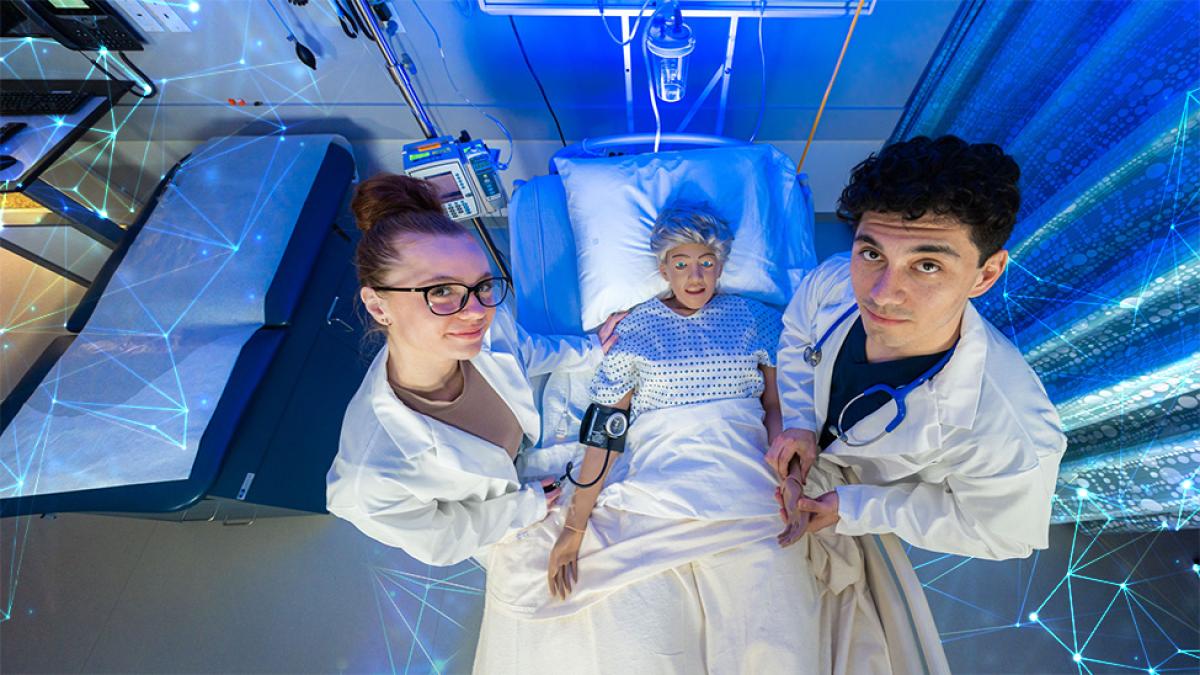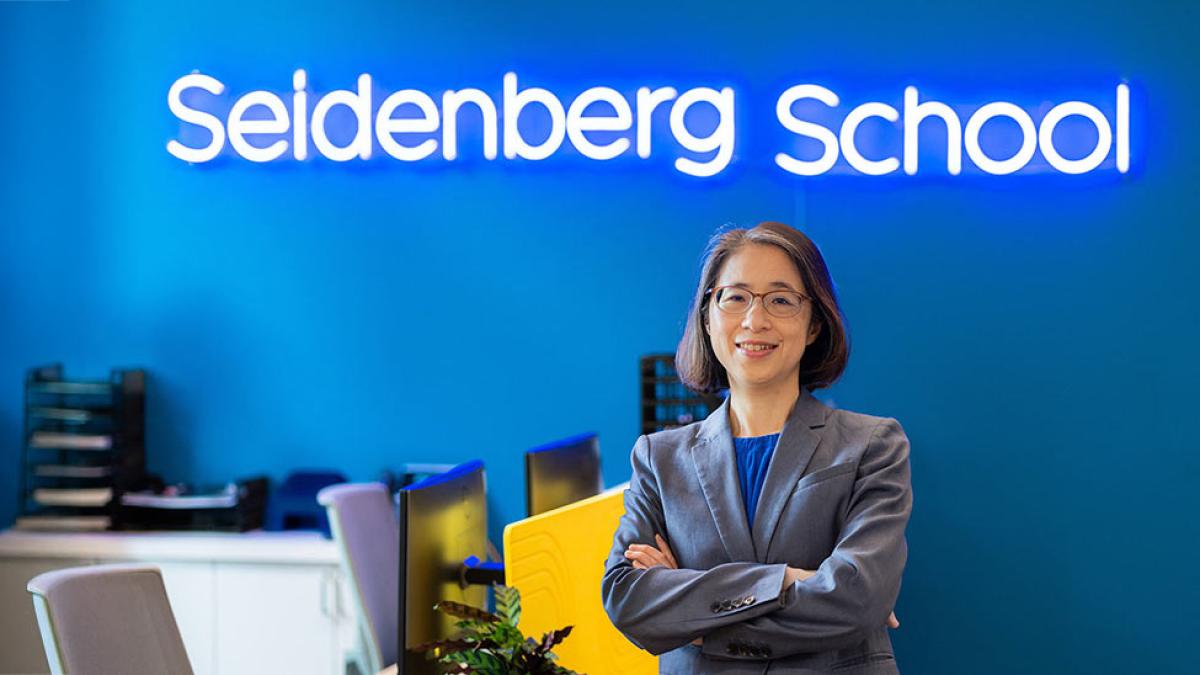With artificial intelligence remodeling how healthcare is researched, and delivered, Pace experts are shaping the technology—and erecting the guardrails—driving the revolution.

Paul Benjamin
Director of Ph.D. program in Computer Science
Biography
Faculty Bio
Dr. Benjamin earned his doctorate in computer science from NYU. He worked for six years in industry before entering academia. Currently, he is professor of computer science and founder and director of the Robotics Lab at Pace University in New York City.
Awards and Honors
- Pace University, 2010, U.S. Patent 60/654,415 - System for Intrusion Detection and Vulnerability Assessment in a Computer Network using Simulation and Machine Learning
- Pace University - CS NY, 2006, Spring 2006 Course Release to write grant proposals
- Reengineering LLC, 2004, U.S. Patent 6,691,132 - Semantic Encoding and Compression of Database Tables
- New York University, 1983, Graduate Research Assistant
Education
PhD, New York University, 1985
Computer Science
MS, New York University, 1982
Computer Science
BFA, Carnegie Mellon University, 1976
Music
MS, Carnegie Mellon University, 1975
Mathematics
BS, Carnegie Mellon University, 1973
Mathematics
Research and Creative Works
Research Interest
Robotics; Artificial Intelligence (Application of Artificial Intelligence to Networks); Cybersecurity; Data Mining; Application of semigroup theory to theory formulation
Grants, Sponsored Research and Contracts
Strengthening Pace’s Cyber Community and Pathways using Research Experience, Technical Training and Institutional Outreach
Chen, L., Benjamin, D., Hayes, D., Ryan, J. & Cotoranu, A. August 2021 - August 2026. National Science Foundation, Federal. Funded.
A Humanoid Robot Hand for Dexterous Manipulation
Benjamin, D. February 2022 - January 2023. Army Research Office, Federal. Currently Under Review.
A Humanoid Robot Hand for Dexterous Manipulation
Benjamin, D. February 2022 - January 2023. Office of Naval Research, Federal. Currently Under Review.
Courses Taught
Past Courses
CIS 101: Forensic Computing
CIT 312: Introduction to Programming l
CIT 314: Introduction to Programming II
CS 121: Computer Programming I
CS 122: Computer Programming II
CS 232: Computer Organization
CS 241: Data Structures/Algorithms I
CS 242: Algorithms & Computing Theory
CS 242: Data Structure/Algorithms II
CS 271: Fndmntl of Unix Operating Sys
CS 271: Fund Unix Operating System
CS 271: Fundmntls of Unix and C Prgmng
CS 325: Introduction to Data Mining
CS 385: Artificial Intelligence I
CS 397: Topic:Linux System Programming
CS 397: Tpc:Windows System Programming
CS 490: Ind Study in Computer Science
CS 502: Fund Comp Sci I using Java
CS 502: Fundamentals of Programming
CS 504: Advanced Programming
CS 504: Fund Comp Sci II using Java
CS 600: Indpndnt Study in Grad CS
CS 604: Computer Systems and Concepts
CS 608: Algorithms & Computing Theory
CS 619: Data Mining
CS 627: Artificial Intelligence
CS 630: Intelligent Agents
CS 631: Topic: Topics in Unix
CS 631: Topic:Linux System Programming
CS 631: Tpc:Windows System Programming
CS 631: UNIX System Programming
CS 638: Network Analysis and Design
CS 646: Entrprs Syst Intgrtn Web Srvc
CS 646: Entrps Syst Intgrtn Web Srvc
CS 648: Unix/Linux Programming
CS 657: Windows System Programming
CS 693: Thesis I
CS 694: Thesis II
CS 701: Advanced Algorithms
CS 702: Research Seminar
CS 727: Adv. Artificial Intelligence
CS 804: Independent Research
CS 806: Dissertation Preparation
CS 827: Advncd Artificial Intelligence
DCS 891: Research Seminar VI
DCS 990: Dissertation for DPS in Cmptng
DCS 991: Dssrttn for DPS in Cmptg II
IS 223: Fundamentals of Programming
IS 323: Object-Oriented Programming
IS 600: Grad Independent Study in IS
IT 669: Building Secure Software II
MM 803: Maintain Matriculation-CS PhD
Publications and Presentations
Publications
A Fast Parallel Algorithm for Comparing Real and Synthetic Video
Xu, X. & Benjamin, D. Vol Studies in Computational Intelligence
DOWNLOAD
Classification and Prediction of Human Behaviors by a Mobile Robot
Benjamin, D. P., Yue, H. & Lyons, D. Academic Journal.
DOWNLOAD
Progress in Building a Cognitive Vision System
, D. P., Lyons, D. & Yue, H.
DOWNLOAD
Professional Contributions and Service
Intellectual Property
Patent: System for Intrusion Detection and Vulnerability Assessment in a Computer Network using Simulation and Machine Learning , United States
Patent: Semantic Encoding and Compression of Database Tables , United States
Professional Memberships
- American Association for Artificial Intelligence
- Association for Computing Machinery
- Sigma Xi
College Service
- MID (Machine Intelligence Day) conference organizing committee [Committee Chair]
- Computer Science Ph.D. Supervisory Committee [Committee Chair]
Professional Service
Biologically Inspired Cognitive Architectures [Committee Member]
Related News and Stories
When generative AI burst onto the scene, Seidenberg faculty were already deep into the work. Learn how the school’s legacy of AI excellence has set the stage for groundbreaking work today and is preparing Pace students for the possibilities of tomorrow.

